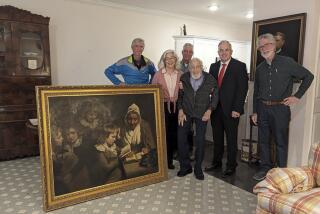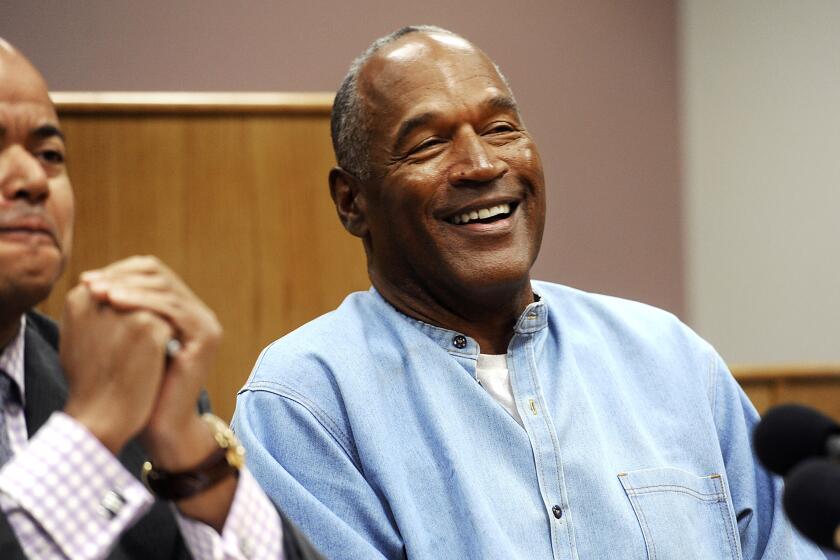Auction house to sell notes written by Robert Kennedy’s killer
Last month his lawyer tried to convince a parole board that Sirhan Sirhan was a brainwashed hit man when he gunned down Sen. Robert F. Kennedy at the Ambassador Hotel in 1968.
But handwritten notes purportedly from Sirhan, kept for 42 years by a Century City executive, suggest that his behavior was calculated and controlled as he waited to shoot the just-victorious presidential primary candidate in the hotel’s kitchen pantry area.
Michael McCowan was an investigator and the youngest member of Sirhan’s defense team in 1969 when the accused assassin sat down with a yellow legal pad and described his visit to a shooting range before his election-night trip to the hotel.
“He wrote it right in front of me,” said McCowan, now 78. Sirhan signed a second statement giving McCowan the rights to the documents, which next week will be sold by a Brentwood auction house.
In March, Sirhan appeared before a parole board for his 14th hearing since his conviction in May 1969. The lawyer currently representing Sirhan suggested he was “manipulated” and “set up” and did not act alone when Kennedy was shot.
William Pepper, who could not be reached Wednesday for comment at his New York office, said last month that Sirhan did not remember the shooting because he was “hypno-programmed” to kill Kennedy.
McCowan disagrees. “It never seemed to me to be a conspiracy,” he said.
During the trial, Sirhan testified that his attitude toward Kennedy hardened in 1967 after the six-day Arab-Israel war when the senator supported giving Israel 50 jet bombers. “He wanted to be a martyr for the Palestinian cause,” McCowan said of Sirhan.
“Sirhan’s not stupid. In his 10th-grade history book from his high school in Pasadena he’d underlined the assassination of President McKinley and on the next page of Archduke Ferdinand.”
Sirhan had then written words to the effect that there would be many more such assassinations, McCowan said. “I think he wanted to be a martyr. To me, he was the first terrorist,” he said.
Before volunteering for Sirhan’s defense team, McCowan had been a Los Angeles police officer and had graduated from law school. He offered to help defense lawyers “because everybody’s entitled to a defense, to their day in court,” as he put it Wednesday.
Auctioneer Nate D. Sanders said there is no doubt the materials — which include a hand-drawn map of the layout of the Ambassador Hotel — are authentic. Sanders, who will sell the documents Tuesday on the website natedsanders.com, said he verified the handwriting by comparing it with known samples of Sirhan’s writing.
Along with the handwritten narrative, materials being sold in an online auction include a telegram from the mother of Lee Harvey Oswald, the killer of President Kennedy, to Sirhan’s mother, Mary Sirhan. “Please accept my sincerest and deepest sympathy,” Marguerite Oswald wrote in 1968.
Many of those involved with Sirhan’s trial are dead — McCowan is the last survivor from the defense team.
In the trial’s closing arguments, Sirhan attorney Grant Cooper acknowledged that “we are not here to free a guilty man. He is guilty of having killed Sen. Robert F. Kennedy.”
Sirhan was incapable of premeditation, added defense attorney Russell Parsons, who praised the testimony of psychiatrists and psychologists who labeled Sirhan as a paranoid schizophrenic.
During the trial, prosecutor Lynn Compton, a chief deputy district attorney, argued that the psychiatric expertise had “highly overcomplicated” the case. One psychologist had testified that Sirhan had been in some sort of hypnotic trance when he shot Kennedy.
Sirhan, now 66 and serving a life sentence, was denied parole at last month’s hearing. Deputy L.A. County Dist. Atty. David Dahle, who represented prosecutors at the hearing, was out of town and could not be reached for comment Wednesday.
But Sandi Gibbons, a spokeswoman for his office, was a news reporter in 1968 who saw Kennedy moments before he was killed and then covered Sirhan’s trial.
She said the auction-bound narrative was never introduced as evidence. “Sirhan had a diminished-capacity defense,” Gibbons said.
More to Read
Start your day right
Sign up for Essential California for news, features and recommendations from the L.A. Times and beyond in your inbox six days a week.
You may occasionally receive promotional content from the Los Angeles Times.







